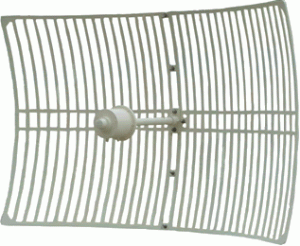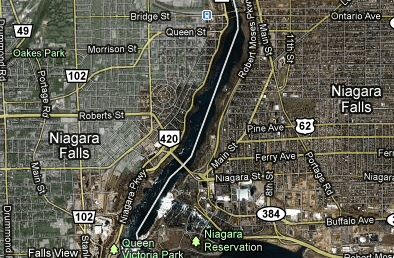
High gain Wi-Fi antennas like this one allowed one Ontario couple to leave Canada's cable companies behind and sign up for Time Warner service in the United States.
Last week, Stop the Cap! compared prices from two Internet Service Providers — Rogers Communications on the western side of the Niagara River — in Ontario, and Time Warner Cable on the eastern side in Niagara Falls, N.Y.
The price disparity is no secret to one Canadian family who read our piece and let us know they import their broadband service, thanks to long distance Wi-Fi, from the United States.
The couple, Neil and Michelle (we’ve been asked not their reveal their real names) and their three boys have lived along the Niagara River, which divides the United States and Canada, for over a decade. Jim has been fascinated with low power, long distance communications since his days in amateur radio.
“I’ve always been trying to see what stations I can pick up, especially low power ones,” Neil tells us.
That curiosity came with Neil to his interest in broadband wireless communications. Living along the river, Neil was fascinated to see Wi-Fi signals make their way across the river from the United States’ side.
“Thanks to a clear shot across the river, and a lot of businesses located adjacent to the Robert Moses Parkway, it’s easy to pickup Wi-Fi signals from businesses on the American side,” says Neil.
Neil discovered many networks wide open for public use and began to consider the implications of “importing” his broadband service from the United States to escape Rogers’ high prices.
“For Canadians, the idea of escaping the country’s communications providers is not that unusual,” Neil says. “Some already have ‘gray market’ satellite dish accounts with America’s DISH or DirecTV, and some even use American prepaid cell phones, which are much cheaper than our own services and get good local reception across Niagara Falls down to Fort Erie.”
“So I began wondering what would happen if we could install a decent Wi-Fi system high enough on the house to get a good signal from a partner on the other side of the river,” Neil pondered. “We started by putting a test signal up and driving through some Niagara Falls neighborhoods on the American side and found some good prospects.”
A long-shot advertisement on a well-known “for-sale/trade” website paid off, when an American family responded, intrigued by the experiment.
“The fact we were willing to pay their cable bill as compensation didn’t hurt either,” Neil suggests. “The chances appeared very good for success, because we can see some of their trees from our roof.”
Neil guessed right because today, with the help of two raised directional, roof-mounted high-gain Wi-Fi antennas that can literally “see” one another, the Ontario family enjoys its cable-TV and broadband service from Time Warner Cable.
“The signal is rock solid and the only time we get some speed problems is if someone in one of the bed and breakfast places nearby ends up on our channel,” Neil says. “We can even watch television with the help of a Slingbox we installed on the American side which works perfectly fine on a Wireless N connection.”
Since the rise of Canada’s exchange rate against America’s declining dollar, the savings are dramatic. A comparable cable-TV plan with Rogers runs $80 a month for standard service, equipment fees, and HD service charges. Add another $50 for broadband service with the modem rental fee and Neil would pay Rogers $130 a month before taxes for the two services.
“And we would be limited to just 60GB of usage per month before the $2/GB overlimit fee started making the bill even higher,” Neil says.
Time Warner Cable currently charges Neil’s adopted family $87 a month for television and broadband on a promotion.
Today, Neil’s conscience (and savings) led him to decide “borrowing” another family’s account wasn’t fair, so now he pays for -two- accounts with Time Warner, one for the New York family, the other belonging to him.
“Time Warner thinks of us as apartment renters and bills a post office box,” Neil says. “The other family doesn’t care about cable-TV anymore so we’re just paying for their broadband account.”
The neighbors are certainly amused.
“When they come over, they call us ‘the American Embassy in Niagara Falls’ because of all the ads for Time Warner they see across the cable channels we get and because American cable systems ignore virtually all Canadian TV networks.”
Why go through all this?
“Now that we’re paying for two accounts, it’s a matter of principle,” Neil says. “I will not do business with a company that slaps usage limits on broadband, and now I don’t have to.”
In fact, now that the family’s sons are getting close to teen years, their Internet use is growing.
“We almost don’t care about the cable-TV anymore ourselves — we’re watching shows online, on-demand in this household,” Neil says. “For my kids, they are growing up with the concept of television being always on-demand and it works around their schedule, not the other way around.”
Besides, Americans have access to Hulu, and Canada does not.
“Hulu is very important, and Netflix was even before it was sold in Canada,” Neil says. “Now we can watch what we want, as much as we want, and pay a fair price for unlimited broadband.”
Neil can’t complain about Time Warner Cable, except for the fact it provides him with a U.S. IP address, which locks him out of a lot of Canadian online video-on-demand services from the CBC and other networks’ websites.
“They do a much better job than Rogers ever did with consistent broadband speeds and fewer outages, and we can live without replays of 18 to Life and Little Mosque on the Prairie,” Neil says. “I’m just glad you folks at Stop the Cap! convinced Time Warner to abandon the kind of pricing that is ruining the hell out of Canada’s broadband.”


 Subscribe
Subscribe

This story reminded me of this article from The Register — one man’s struggle to acquire broadband service at an unserved location and the high gain antenna that proved to be the solution:
http://www.theregister.co.uk/2010/12/03/not_spot_diary/
Continued here:
http://www.theregister.co.uk/2011/02/03/not_spot_no_longer/
I don’t see why Neil and Michele went public with you on this.
I predict the ISPs will get some regulator to take their equipment’s license away… They work hard to prevent people from rolling their own ISPs so avoiding the Bell tax and Rogering fee is a definite no-no!
This? Amazing.
More neighbors in the US or other places with “unlimited” connections should band together to save on the cost of broadband internet. This guy is being too nice complying with the TOS and not “sharing” one single connection. Good for him, but no one would have known. Feelin’ sorry for Canadians and their plight with expensive internet.
Would love to see technical details about their rig.